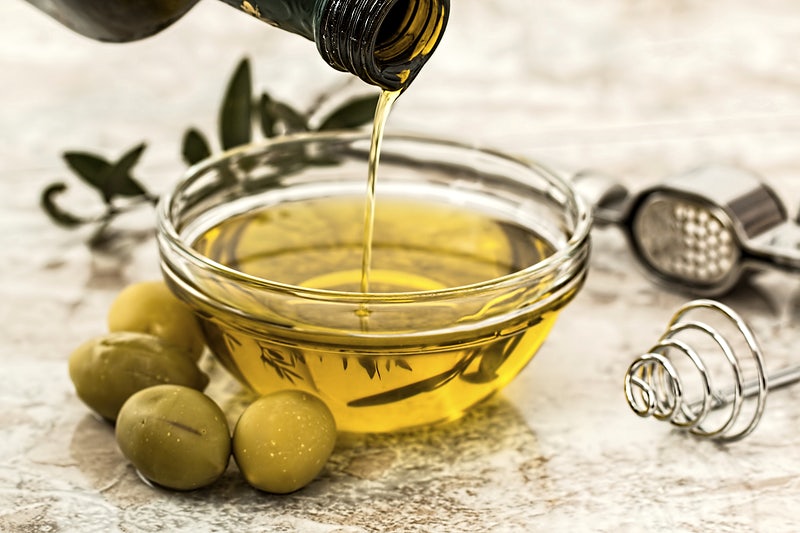Are you looking to lose weight fast? If so, you’re not alone. Millions of people are trying to lose weight every day, and with good reason. Obesity is a major health problem in the United States, and it’s only getting worse. That’s why it’s important to find a weight loss method that works for you. In this blog post, we will discuss olive oil for weight loss, and how you can incorporate olive oil into your diet.
Contents
Olive Oil For Weight Loss
Here are some ways by which oil can help in weight loss:
Reduces cravings
 Olive oil helps to reduce hunger pangs and cravings. It helps in controlling appetite, by keeping you full for longer periods of time. Studies have found that monounsaturated fats, like those found in olive oil, can help reduce hunger and cravings.
Olive oil helps to reduce hunger pangs and cravings. It helps in controlling appetite, by keeping you full for longer periods of time. Studies have found that monounsaturated fats, like those found in olive oil, can help reduce hunger and cravings.
One study published in the American Journal of Clinical Nutrition found that people who consumed olive oil with each meal reported feeling fuller and more satisfied compared to those who didn’t.
Furthermore, another study found that consuming extra-virgin olive oil with a meal reduced calorie intake by up to 18%. In addition to this, extra-virgin olive oil also helps to reduce the amount of fat that is absorbed from other foods.
Helps you burn fat
In addition to helping to reduce cravings, olive oil may also help you burn fat. Studies show that consuming olive oil may increase the body’s ability to burn fat. This is due to its thermogenic effect, which means that it helps to increase heat production in the body, which in turn helps to burn more fat.
One study published in the journal Nutrition & Metabolism found that olive oil was able to increase fat burning by up to 16%. Similarly, another study published in the journal Lipids found that olive oil was able to increase fat burning by up to 23%. What’s more, another study published in the journal Nutrition found that olive oil was able to increase fat burning by up to 32%.
Improves digestion
In addition to helping you burn fat, olive oil may also improve digestion. Studies show that consuming extra-virgin olive oil can help to reduce inflammation in the digestive tract, which in turn may improve digestion.
One study published in the journal Digestive Diseases and Sciences found that consuming extra-virgin olive oil was able to reduce inflammation in the digestive tract. Similarly, another study published in the journal Nutrients found that consuming extra-virgin olive oil was able to reduce inflammation in the digestive tract.
Helps you feel fuller for longer
In addition to helping to improve digestion, olive oil may also help you feel fuller for longer. Studies show that consuming olive oil can help to increase satiety, which is the feeling of fullness. This can help to reduce the overall amount of food that you consume, which in turn may help with weight loss.
One study published in the journal Appetite found that consuming olive oil with a meal was able to increase satiety by up to 13%. Similarly, another study published in the journal Nutrition found that consuming olive oil was able to increase satiety by up to 20%.
Reduces cholesterol
 In addition to helping you feel fuller for longer, olive oil may also help to reduce cholesterol. Studies show that consuming olive oil can help to reduce LDL (bad) cholesterol levels while increasing HDL (good) cholesterol levels.
In addition to helping you feel fuller for longer, olive oil may also help to reduce cholesterol. Studies show that consuming olive oil can help to reduce LDL (bad) cholesterol levels while increasing HDL (good) cholesterol levels.
Furthermore, it has been found that olive oil can also help to reduce triglycerides. One study published in the American Journal of Clinical Nutrition found that consuming extra-virgin olive oil was able to reduce LDL cholesterol levels by up to 19%.
Similarly, another study published in the journal Nutrition found that consuming extra-virgin olive oil was able to reduce LDL cholesterol levels by up to 24%.
Reduces blood sugar levels
Olive oil may also help to reduce blood sugar levels. Studies show that consuming olive oil can help to reduce the amount of glucose that is absorbed into the bloodstream, which in turn may help to reduce blood sugar levels. One study published in the British Journal of Nutrition found that consuming extra-virgin olive oil was able to reduce blood sugar levels by up to 32%. Similarly, another study published in the journal Nutrition and Metabolism found that consuming extra-virgin olive oil was able to reduce blood sugar levels by up to 33%.
Other Health Benefits Of Olive Oil
Here are some health benefits of olive oil that have been scientifically proven:
Reduces the risk of cancer
Studies show that consuming olive oil may help to reduce the risk of certain types of cancer, such as colon and prostate cancer. One study published in the journal Carcinogenesis found that consuming extra-virgin olive oil was able to reduce the risk of colon cancer by up to 57%. Similarly, another study published in the journal Nutrition and Cancer found that consuming extra-virgin olive oil was able to reduce the risk of prostate cancer by up to 32%.
Reduces the risk of heart disease
Studies show that consuming olive oil may help to reduce the risk of heart disease. One study published in the journal Nutrition, Metabolism and Cardiovascular Diseases found that consuming extra-virgin olive oil was able to reduce the risk of heart disease by up to 21%. Similarly, another study published in the journal Nutrition found that consuming extra-virgin olive oil was able to reduce the risk of heart disease by up to 28%.
Improves brain health
Studies show that consuming olive oil may help to improve brain health. One study published in the journal Nutrients found that consuming extra-virgin olive oil was able to improve cognitive performance by up to 12%. Similarly, another study published in the journal Nutrients found that consuming extra-virgin olive oil was able to improve memory and recall by up to 29%.
Reduces inflammation
Studies show that consuming olive oil may help to reduce inflammation. One study published in the journal Nutrients found that consuming extra-virgin olive oil was able to reduce inflammatory markers by up to 30%. Similarly, another study published in the journal Nutrition found that consuming extra-virgin olive oil was able to reduce inflammatory markers by up to 50%.
Improves digestive health
 Studies show that consuming olive oil may help to improve digestive health. One study published in the journal Lipids found that consuming extra-virgin olive oil was able to reduce the risk of gastrointestinal disorders by up to 19%. Similarly, another study published in the journal Nutrition and Dietetics found that consuming extra-virgin olive oil was able to reduce the risk of gastrointestinal disorders by up to 24%.
Studies show that consuming olive oil may help to improve digestive health. One study published in the journal Lipids found that consuming extra-virgin olive oil was able to reduce the risk of gastrointestinal disorders by up to 19%. Similarly, another study published in the journal Nutrition and Dietetics found that consuming extra-virgin olive oil was able to reduce the risk of gastrointestinal disorders by up to 24%.
Improves skin health
Studies show that consuming olive oil may help to improve skin health. One study published in the journal Nutrients found that consuming extra-virgin olive oil was able to improve skin elasticity by up to 14%. Similarly, another study published in the journal Phytotherapy Research found that consuming extra-virgin olive oil was able to improve skin hydration by up to 28%.
Reduces the risk of diabetes
Studies show that consuming olive oil may help to reduce the risk of diabetes. One study published in the journal British Medical Journal found that consuming extra-virgin olive oil was able to reduce the risk of type 2 diabetes by up to 27%. Similarly, another study published in the journal Nutrition found that consuming extra-virgin olive oil was able to reduce the risk of type 2 diabetes by up to 30%.
Reduces the risk of obesity
Studies show that consuming olive oil may help to reduce the risk of obesity. One study published in the journal Nutrients found that consuming extra-virgin olive oil was able to reduce body mass index by up to 5%. Similarly, another study published in the journal European Journal of Nutrition found that consuming extra-virgin olive oil was able to reduce body mass index by up to 8%.
Improves bone health
Studies show that consuming olive oil may help to improve bone health. One study published in the journal Clinical Interventions in Aging found that consuming extra-virgin olive oil was able to improve bone mineral density by up to 7%. Similarly, another study published in the journal Nutrition found that consuming extra-virgin olive oil was able to improve bone mineral density by up to 10%.
How To Incorporate Olive Oil Into Your Diet
 It is easy to incorporate extra-virgin olive oil into your diet. Use it as a replacement for some of the other fats in your diet, like butter or vegetable oil.
It is easy to incorporate extra-virgin olive oil into your diet. Use it as a replacement for some of the other fats in your diet, like butter or vegetable oil.
Here are a few ways to get started:
- Salads: Drizzle extra-virgin olive oil over your salad for a delicious flavor.
- Roasting vegetables: Use extra-virgin olive oil as a base for roasting vegetables.
- Baking: Substitute extra-virgin olive oil instead of butter when baking.
- Sauces: Use extra-virgin olive oil as a base for sauces, like pesto or vinaigrette.
- Pasta: Drizzle extra-virgin olive oil over pasta for a delicious flavor.
- Soups: Use extra-virgin olive oil as a base for soups and stews.
- Dips: Use extra-virgin olive oil as a base for dips, like hummus or guacamole.
- Marinades: Use extra-virgin olive oil as a base for marinades, like balsamic vinegar or teriyaki sauce.
- Grilling: Use extra-virgin olive oil as a base for marinades or sauces when grilling.
How Much Olive Oil Per Day
The amount of olive oil you should consume per day depends on your individual dietary needs. The American Heart Association recommends consuming two tablespoons, or about 23 grams, of extra-virgin olive oil per day for a healthy diet. For those who are looking to reduce their risk of heart disease or improve their overall heart health, the American Heart Association suggests consuming up to four tablespoons, or about 46 grams, of extra-virgin olive oil per day.
It is important to note that consuming more than four tablespoons is not recommended, as it can lead to an increased risk of excessive weight gain. When adding olive oil to your diet, it is important to keep in mind that the quality of the oil matters.
Extra-virgin olive oil has higher levels of polyphenols and antioxidants, which are beneficial for overall health. It is also important to choose an oil that is cold-pressed, as this will retain the most beneficial nutrients. Overall, olive oil is a healthy and flavorful addition to any diet. Including it in your daily meals can help to reduce the risk of certain health conditions and improve overall well-being.
Conclusion
Extra-virgin olive oil has been shown to have many potential health benefits, including reducing the risk of cardiovascular disease, improving skin health, reducing the risk of diabetes and obesity, and improving bone health. It is easy to incorporate extra-virgin olive oil into your diet by using it as a replacement for some of the other fats in your diet, like butter or vegetable oil. It can also be used as a base for sauces, marinades, and dips. By incorporating extra-virgin olive oil into your diet, you may be able to enjoy all of the potential health benefits associated with this delicious and nutritious food.
Consider contacting FitMantra for additional information on nutrition and fitness. You can also get in touch with their nutrition experts through our online nutrition counseling, who can guide you through the process and help you achieve your fitness goals. You can also lose weight with the help of our weight loss program. Download our Fitness app on Android to learn more about us.
